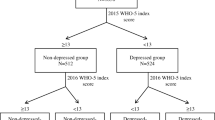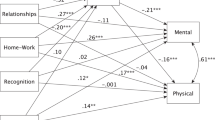Abstract
Objective
This study was conducted to investigate the association between depressive symptoms and job stress, as measured by the KOSS, among Korean employees in small- and medium-sized enterprises, and examined which components of stress are involved in the risk for depression among males and females.
Methods
Data were collected from a work-stress survey of full-time employees of small- and medium-sized enterprises in Incheon, South Korea. A total of 3,013 participants were included in the analysis. Job stress was measured using 24 items (7 sub-scales) of the short form of Korean occupational stress scale (KOSS-SF), and depressive symptoms were evaluated using Center for epidemiologic studies depression scale (CES-D).
Results
After adjustment for confounding variables, most of subscales of job stress contributed to an increased risk of depressive symptoms, and job insecurity (male; OR = 2.02, 95%CI: 1.61–2.40, female; OR = 1.95, 95%CI: 1.42–2.70) and occupational climate (male; OR = 1.84, 95%CI: 1.49–2.28, female; OR = 1.78, 95%CI: 1.30–2.49) showed strong associations in both male and female. Other subscales revealed different effects for males and females; for males, job demands (OR = 1.68, 95%CI: 1.43–2.20), inadequate social support (OR = 1.55, 95%CI: 1.23–1.94), and lack of rewards (OR = 1.88, 95%CI: 1.48–2.37) were associated with depressive symptoms, whereas for females, organizational injustice (OR = 1.62, 95%CI: 1.14–2.30) was associated with depressive symptoms.
Conclusion
These results indicate that job stress may play a significant role in increasing the risk of depressive symptoms, and that further preventive efforts and research are needed to reduce job stress and address health problems caused by job stress among Korean employees.
Similar content being viewed by others
References
Bultmann U, Kant IJ, Van den Brandt PA, Kasl SV (2002) Psychosocial work characteristics as risk factors for the onset of fatigue and psychological distress: prospective results from the Maastricht Cohort Study. Psychol Med 32:333–345
Chang SJ, Koh SB, Kang D, Kim SA, Kang MG, Lee CG et al (2005) Developing an occupational stress scale for Korean employees (in Korean). Korean J Occup Environ Med 17:297–317
Cho JM (2004) Flexibility, instability and institutional insecurity in Korean labor market. J Policy Model 26:315–351. doi:10.1016/j.jpolmod.2004.03.006
Cho MJ, Kim KH (1993) Diagnostic validity of the CES-D(Korean version) in the assessment of DSM-III-R major depression (in Korean). J Korean Neuropsychiatr Assoc 32:381–399
Cho MJ, Nam JJ, Suh GH (1998) Prevalence of symptoms of depression in a nationwide sample of Korean adults. Psychiatry Res 81:341–352. doi:10.1016/S0165-1781(98)00122-X
de Jonge J, Bosma H, Peter R, Siegrist J (2000) Job strain, effort-reward imbalance and employee well-being: a large-scale cross-sectional study. Soc Sci Med 50:1317–1327. doi:10.1016/S0277-9536(99)00388-3
Elovainio M, Kivimaki M, Vahtera J (2002) Organizational justice: evidence of a new psychosocial predictor of health. Am J Public Health 92:105–108
Fuhrera R, Stansfeldb SA (2002) How gender affects patterns of social relations and their impact on health: a comparison of one or multiple sources of support from ‘‘close persons’’. Soc Sci Med 54:811–825. doi:10.1016/S0277-9536(01)00111-3
Goldberg P, David S, Landre MF, Goldberg M, Dassa S, Fuhrer R (1996) Work conditions and mental health among prison staff in France. Scand J Work Environ Health 22:45–54
Hur JJ (2004) Economic crisis, income support, and employment generating programs: the Korea’s experience (in Korean). Korea Labor Institute , Seoul
Hwang SK (2003) Job characteristics and occupational sex segregation; view form women’s work in South Korea (in Korean). Korea Labor Institute, Seoul, pp 1–107
Johnson J, Weissman MM, Klerman GL (1992) Service utilization and social morbidity associated with depressive symptoms in the community. JAMA 267:1478–1483. doi:10.1001/jama.267.11.1478
Karasek R, Brisson C, Kawakami N, Houtman I, Bongers P, Amick B (1998) The job content questionnaire (JCQ): an instrument for internationally comparative assessments of psychosocial job characteristics. J Occup Health Psychol 3:322–355. doi:10.1037/1076-8998.3.4.322
Kawakami N, Haratani T, Araki S (1992) Effects of perceived job stress on depressive symptoms in blue-collar workers of an electrical factory in Japan. Scand J Work Environ Health 18:195–200
Khang YH, Lynch JW, Kaplan GA (2005) Impact of economic crisis on cause-specific mortality in South Korea. Int J Epidemiol 34:1291–1301. doi:10.1093/ije/dyi224
Kim CY (2005) The Korean economic crisis and coping strategies in the health sector:pro-welfarism orneoliberalism? Int J Health Serv 35:561–578. doi:10.2190/QK9Q-KRR3-TLW8-0950
Kim SK, Finch J (2002) Confucian patriarchy reexamined: Korean families and the IMF economic crisis. Good Soc 11:43–49. doi:10.1353/gso.2003.0007
Kim JO, Muller CW (1978) Factor analysis. Statistical methods and practical issue. Sage, London
Kim IH, Muntaner C, Khang YH, Paek D, Cho SI (2006) The relationship between nonstandard working and mental health in a representative sample of the South Korean population. Soc Sci Med 63:566–574. doi:10.1016/j.socscimed.2006.02.004
Kivimaki M, Elovainio M, Vahtera J, Ferrie JE (2003) Organisational justice and health of employees: prospective cohort study. Occup Environ Med 60:27–33. doi:10.1136/oem.60.1.27
Korea National Statistical Office (2005) Report on the census on basic characteristics of establishments
Kudielka BM, Hanebuth D, von Kanel R, Gander ML, Grande G, Fischer JE (2005) Health-related quality of life measured by the SF12 in working populations: associations with psychosocial work characteristics. J Occup Health Psychol 10:429–440. doi:10.1037/1076-8998.10.4.429
Laaksonen M, Rahkonen O, Martikainen P, Lahelma E (2006) Associations of psychosocial working conditions with self-rated general health and mental health among municipal employees. Int Arch Occup Environ Health 79:205–212. doi:10.1007/s00420-005-0054-7
Lennon MC (1987) Sex differences in distress: the impact of gender and work roles. J Health Soc Behav 28:290–305. doi:10.2307/2136847
Li J, Yang W, Cho SI (2006) Gender differences in job strain, effort-reward imbalance, and health functioning among Chinese physicians. Soc Sci Med 62:1066–1077. doi:10.1016/j.socscimed.2005.07.011
Miller DT (2001) Disrespect and experience of injustice. Annu Rev Psychol 52:527–580. doi:10.1146/annurev.psych.52.1.527
Niedhammer I, Goldberg M, Leclerc A, Bugel I, David S (1998) Psychosocial factors at work and subsequent depressive symptoms in the Gazel cohort. Scand J Work Environ Health 24:97–205
Niedhammer I, Chastang JF, David S, Barouhiel L, Barrandon G (2006) Psychosocial work environment and mental health: job-strain and effort-reward imbalance models in a context of major organizational changes. Int J Occup Environ Health 12:111–119
Paterniti S, Niedhammer I, Lang T, Consoli SM (2002) Psychosocial factors at work, personality traits and depressive symptoms. Longitudinal results from the GAZEL study. Br J Psychiatry 181:11–117. doi:10.1192/bjp.181.5.406
Peter R, Hammarström A, Hallqvist J, Siegrist J, Theorell T, SHEEP Study Group (2006) Does occupational gender segregation influence the association of effort-reward imbalance with myocardial infarction in the SHEEP study? Int J Behav Med 13:34–43. doi:10.1207/s15327558ijbm1301_5
Pikhart H, Bobak M, Pajak A, Malyutina S, Kubinova R, Topor R et al (2004) Psychosocial factors at work and depression in three countries of Central and Eastern Europe. Soc Sci Med 58:1475–1482. doi:10.1016/S0277-9536(03)00350-2
Radloff LS (1977) The CES-D scale: a self-report depression scale for research in the general population. Appl Psycholol Meas 1:385–401. doi:10.1177/014662167700100306
Rugulies R, Bultmann U, Aust B, Burr H (2006) Psychosocial work environment and incidence of severe depressive symptoms: prospective findings from a 5-year follow-up of the Danish work environment cohort study. Am J Epidemiol 163:877–887. doi:10.1093/aje/kwj119
Rugulies R, Aust B, Burr H, Bültmann U (2008) Job insecurity, chances on the labour market and decline in self-rated health in a representative sample of the Danish workforce. J Epidemiol Community Health 62:245–250. doi:10.1136/jech.2006.059113
Siegrist J (1996) Adverse health effects of high-effort/low-reward conditions at work. J Occup Health Psychol 1:27–43. doi:10.1037/1076-8998.1.1.27
Stansfeld S, Candy B (2006) Psychosocial work environment and mental health—a meta-analytic review. Scand J Work Environ Health 32:443–462
Stansfeld S, Feeney A, Head J, Canner R, North F, Marmot M (1995) Sickness absence for psychiatric illness: the Whitehall II Study. Soc Sci Med 40:189–197. doi:10.1016/0277-9536(94)E0064-Y
Stansfeld SA, Bosma H, Hemingway H, Marmot MG (1998) Psychosocial work characteristics and social support as predictors of SF-36 health functioning: the Whitehall II study. Psychosom Med 60:247–255
Stansfeld SA, Fuhrer R, Shipley MJ, Marmot MG (1999) Work characteristics predict psychiatric disorder: prospective results from the Whitehall II Study. Occup Environ Med 56:302–307
Sverke M, Hellgren J, Naswall K (2002) No security: a meta-analysis and review of job insecurity and its consequences. J Occup Health Psychol 7:242–264. doi:10.1037/1076-8998.7.3.242
Tsutsumi A, Kayaba K, Theorell T, Siegrist J (2001) Association between job stress and depression among Japanese employees threatened by job loss in a comparison between two complementary job-stress models. Scand J Work Environ Health 27:146–153
Wang J, Patten SB (2001) Perceived work stress and major depression in the Canadian employed population, 20–49 years old. J Occup Health Psychol 6:283–289. doi:10.1037/1076-8998.6.4.283
Yun GW (2006) Similarities and Differences in Korean, Chinese, and Japanese Corporate Cultures. Hanyang University Asia-Pacific research center 29:47–99
Acknowledgement
This work was supported by INHA UNIVERSITY Research Grant.
Author information
Authors and Affiliations
Corresponding author
Appendix 1
Appendix 1
The short form of Korean occupational stress scale (KOSS-SF)
Subscales | Contents | Questions |
|---|---|---|
Job demand | Time pressure | Due to many things to do, I always feel time pressure |
Increasing workload | My job has become increasingly overloading | |
Insufficient rest | Sufficient rest is provided during working hours | |
Multiple functioning | I have to do various jobs simultaneously | |
Insufficient | Noncreative work | My work requires creativity |
Job control | Skill underutilization | My work requires a high level of skill or knowledge |
Little or no decision-making | I can make my own decision in my job and give influence over the work | |
Low control | I can control my work pace and time schedule | |
Inadequate social support | Inadquate supervisor support | My supervisor is helpful in getting the job done |
Inadquate coworker support | My coworker is helpful in getting the job done | |
Lack of emotional support | I have someone who understands my difficulties at work | |
Job insecurity | Uncertainty | My future is uncertain because the current situation of my company is unstable |
Changes negative to my job | Undesirable changes (i.e. downsizing) will come to my job | |
Organizational system | Unfair organizational polity | The organizational polity of my company is fair and reasonable |
Unsatisfactory organizational support | My company provides me with sufficient organizational supports | |
Inter-department conflict | Departments cooperate each other without conflicts | |
Limitation of communication | I have opportunities and channels to talk about my ideas | |
Lack of reward | Unfair treatment | I acquire respect and confidence from my company |
Future ambiguity | I believe that I will be given more rewards from my company if I work hard | |
Interruption of opportunity | I am provided with opportunity of developing my capacity | |
Occupational climate | Collective culture | Dining out after work makes me uncomfortable |
Inconsistency of job order | I am asked to do my work with irrational principle or inconsistency | |
Authoritarian culture | My company climate is authoritative and hierarchical | |
Gender discrimination | I take disadvantages since I am woman (man) |
Rights and permissions
About this article
Cite this article
Park, SG., Min, KB., Chang, SJ. et al. Job stress and depressive symptoms among Korean employees: the effects of culture on work. Int Arch Occup Environ Health 82, 397–405 (2009). https://doi.org/10.1007/s00420-008-0347-8
Received:
Accepted:
Published:
Issue Date:
DOI: https://doi.org/10.1007/s00420-008-0347-8




